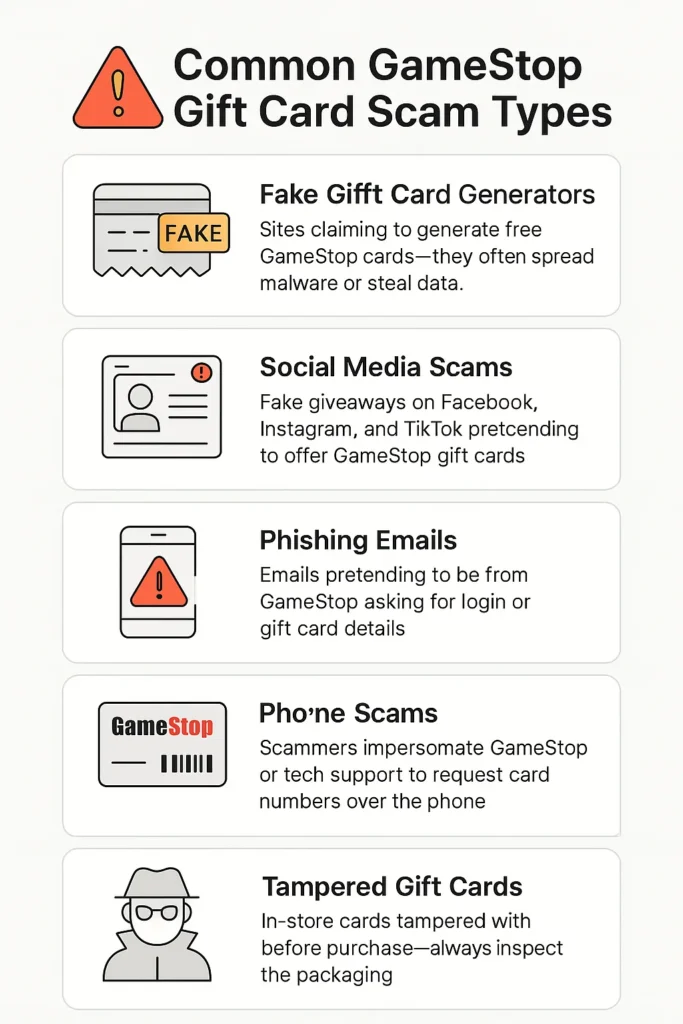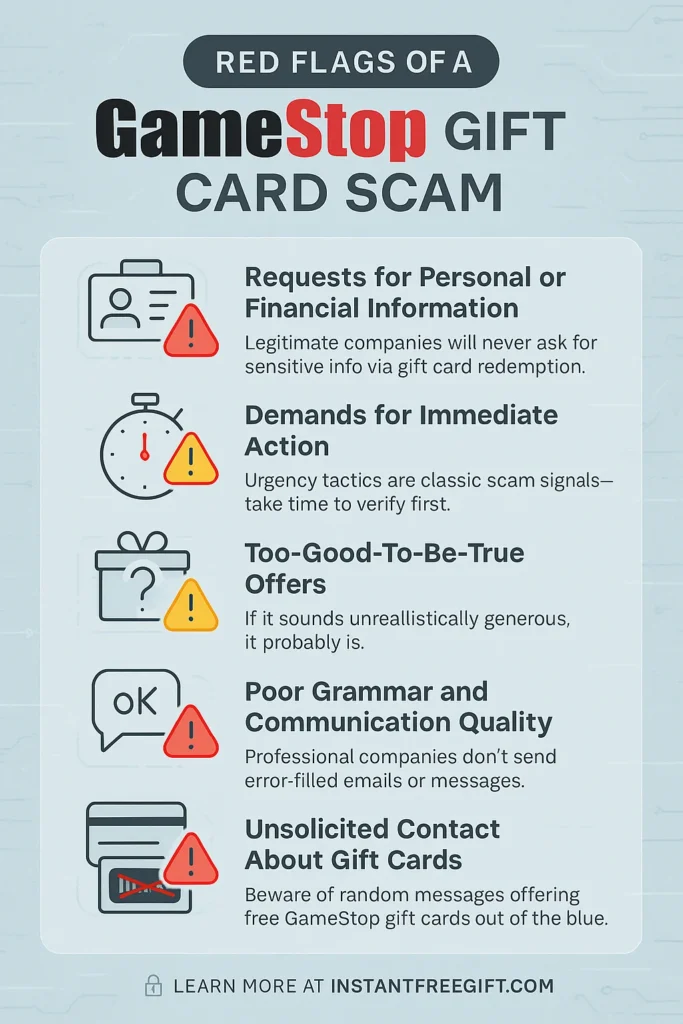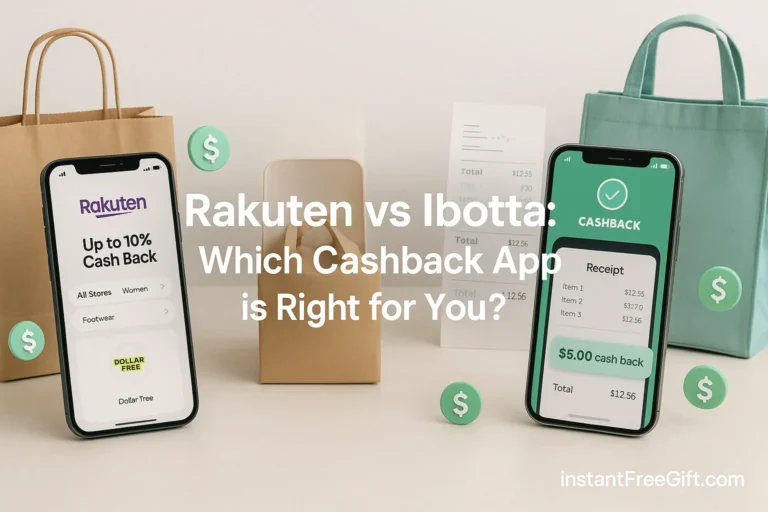How to Spot and Avoid GameStop Gift Card Scams

In today’s digital economy, gift cards have become a popular choice for gifts and personal purchases alike. Among these, GameStop gift cards are particularly attractive to gamers and tech enthusiasts. Unfortunately, this popularity has also made them prime targets for scammers looking to exploit unsuspecting consumers. GameStop gift card scams have become increasingly sophisticated, costing victims millions of dollars annually and leaving them with worthless cards or compromised personal information.
The rise in GameStop gift card scams isn’t surprising. These cards are essentially digital cash—easily transferable, difficult to trace, and nearly impossible to recover once spent. Scammers leverage these qualities, along with consumers’ excitement for gaming deals and the trusted GameStop brand, to create convincing fraudulent schemes that can fool even cautious shoppers.
This comprehensive guide will help you understand how to spot GameStop gift card scams in their various forms and provide practical strategies to avoid GameStop gift card scams altogether. By recognizing the warning signs and knowing the preventative measures to take, you can protect yourself and your finances while still enjoying the convenience of gift cards for your gaming purchases.
Common GameStop Gift Card Scam Types

Fraudsters have developed numerous approaches to trick consumers into parting with their money or personal information through GameStop gift card scams. Understanding these common scam types is your first line of defense.
Fake Gift Card Generators
One of the most prevalent GameStop gift card scams involves websites or applications claiming to generate free gift card codes:
- How they claim to work: These “generators” purportedly exploit security flaws in GameStop’s systems to create valid gift card codes without payment.
- The reality: These are sophisticated scams designed to:
- Install malware on your device
- Steal personal information through required “verification” steps
- Trick you into completing endless surveys that generate revenue for scammers
- Collect payment card details for supposed “verification” purposes
- Why they can’t work: GameStop’s gift card systems use secure encryption and validation protocols. Legitimate gift card codes aren’t created through predictable algorithms that could be reverse-engineered.
- Warning sign: The universal rule applies—if something seems too good to be true, it invariably is. No legitimate service can provide free GameStop credit through code generation.
Social Media Scams
Social platforms have become fertile ground for GameStop gift card scams due to their reach and the trust associated with familiar brands and connections:
- Fake giveaways and promotions:
- Scammers create convincing but fraudulent GameStop-branded pages
- They announce “limited-time” or “exclusive” gift card giveaways
- Users are asked to like, share, and tag friends to “qualify”
- The real goal: building follower counts to sell accounts or directing victims to phishing sites
- Friend impersonation scams:
- Hackers compromise accounts and message contacts about “amazing GameStop card deals”
- They may claim to have discount codes or offer to sell gift cards at reduced prices
- These offers lead to payment for cards that never arrive or contain zero balance
- Phishing links:
- Fraudulent posts containing links to “claim your free GameStop gift card”
- These links lead to fake GameStop-branded sites designed to steal login credentials or payment information
- Some deploy malware when clicked
According to the Federal Trade Commission, social media scams accounted for over $117 million in gift card fraud losses in the past year alone, with gaming-related gift cards being a prime target.
Phishing Emails
Email-based GameStop gift card scams remain effective despite increased awareness:
- Common scenarios:
- Emails claiming you’ve “won” a GameStop gift card in a contest you never entered
- Messages suggesting your GameStop rewards account needs verification
- Notifications about “expiring” GameStop gift card balances requiring immediate action
- Offers for exclusive or discounted gift cards due to “customer appreciation”
- Tactics used:
- Creating urgency to prevent careful consideration
- Using GameStop branding and logos to appear legitimate
- Including links to professional-looking but fraudulent websites
- Using domain names similar to official GameStop addresses (e.g., game-stop.com instead of gamestop.com)
- End goals:
- Stealing account credentials
- Capturing payment information
- Installing tracking software or malware
- Getting victims to purchase legitimate gift cards and share the codes with scammers
Phone Scams
Perhaps the most brazen GameStop gift card scams involve direct phone contact:
- Payment demand scams:
- Callers impersonate government officials, utility companies, or tech support
- They claim you owe money that must be paid immediately to avoid serious consequences
- GameStop gift cards are specifically requested as payment
- Once you provide the card codes, your money is irretrievably lost
- “Grandparent” or emergency scams:
- Scammers call pretending to be a relative in trouble
- They request GameStop gift cards for an “emergency situation”
- They may have personal details gathered from social media to make the call more convincing
- Why gift cards?: Legitimate organizations NEVER request payment via gift cards. Scammers prefer them because transactions are:
- Untraceable
- Irreversible
- Not subject to consumer protection laws that cover credit cards
Tampered Gift Cards
Physical GameStop gift card scams involve manipulation of cards found in retail displays:
- How the scam works:
- Fraudsters record card numbers and PINs from in-store displays
- They replace the tamper-evident covering over the PIN
- They monitor the cards until someone purchases and activates them
- The scammer then spends the balance before the legitimate purchaser can
- Advanced techniques:
- Some scammers actually remove cards from packaging, record information, and return them
- Others create fake barcodes that activate different cards than the ones purchased
- Some tamper with the activation barcode so the card never gets properly loaded
- Impact: The legitimate purchaser essentially buys an empty card, and proving the fraud occurred can be challenging.
“Mystery Shopper” Scams
This elaborate scheme targets job seekers with promises of easy work evaluating retailers:
- The setup:
- Victims receive official-looking employment offers for “mystery shopper” positions
- Their first “assignment” involves evaluating GameStop’s gift card services
- They receive a fraudulent check as an “advance” and instructions to:
- Deposit the check
- Use a portion to purchase GameStop gift cards
- Evaluate the “customer service experience”
- Send the gift card codes to their “employer” for verification
- Keep the remaining money as payment
- The scam: The initial check is fake but may take days or weeks for banks to discover. By then:
- Victims have already purchased and shared gift card codes
- The bank reverses the check deposit
- Victims lose both the gift card value and may face bank fees
For more information about protecting yourself while shopping at GameStop, check out our guide on GameStop PowerUp Rewards: Everything You Need to Know, which includes official ways to save money safely.
Red Flags of a GameStop Gift Card Scam

Learning to recognize the warning signs of GameStop gift card scams can save you from becoming a victim. Here are the major red flags that should immediately raise your suspicions:
Requests for Personal or Financial Information
Legitimate gift card transactions require minimal personal data:
- Dangerous requests:
- Social Security numbers
- Bank account information
- Credit card details for “verification” purposes
- Copies of identification documents
- Login credentials for GameStop or other accounts
- Why it’s suspicious: GameStop never needs your SSN or banking details for gift card purchases or redemption. Any request for this sensitive information indicates a likely scam.
- Protection tip: Create a mental checklist of information that should never be shared in connection with gift cards. If you’re asked for any of these details, terminate the interaction immediately.
Demands for Immediate Action
Scammers rely on creating urgency to override your critical thinking:
- Common pressure tactics:
- “Limited time offer that expires in hours or minutes”
- “Only 5 gift cards left at this price”
- “Your account will be suspended unless you verify now”
- “Legal action is pending unless payment is made today”
- Why it works: Fear and excitement can bypass rational decision-making processes. When combined with a “limited-time opportunity,” many people act before carefully evaluating the situation.
- Reality check: Legitimate businesses rarely create extreme urgency around gift card offers. GameStop promotions typically run for days or weeks, not minutes or hours.
Too-Good-To-Be-True Offers
Perhaps the most obvious yet still effective red flag is the unrealistic offer:
- Suspicious deals:
- 50% or more off gift card values
- Free gift cards with no purchase required
- “Secret methods” to get unlimited gift card codes
- Exclusive offers not mentioned on official GameStop channels
- Mathematical reality: Gift cards represent cash value to retailers. Offering significant discounts (beyond occasional 10-15% promotions) simply doesn’t make business sense.
- Legitimate discounts: GameStop does occasionally offer modest discounts or bonus offers through their PowerUp Rewards program, but these are clearly advertised on official channels and rarely exceed 10-20% in value.
Poor Grammar and Communication Quality
Professional companies maintain high standards in their communications:
- Warning signs:
- Obvious spelling and grammatical errors
- Inconsistent formatting
- Misused company logos or outdated branding
- Generic greetings (“Dear Valued Customer”) instead of your name
- Unusual sentence structures suggesting non-native English writers
- Why it matters: While everyone makes occasional typos, legitimate corporate communications from GameStop undergo review processes that catch obvious errors. Multiple issues suggest fraudulent origin.
- Exception note: Even this red flag isn’t foolproof, as sophisticated scammers have improved their communications quality significantly in recent years.
Unsolicited Contact About Gift Cards
Being approached out of the blue about GameStop gift cards should immediately raise concerns:
- Suspicious situations:
- Emails about gift cards you didn’t request
- Direct messages on social media from unfamiliar accounts
- Texts about GameStop offers from unknown numbers
- Calls regarding gift card verification or special offers
- Legitimate contact: GameStop will generally only send communications if you’ve:
- Signed up for their promotional emails
- Are a PowerUp Rewards member
- Recently made a purchase and provided contact information
- Protection strategy: When receiving unsolicited communications, never click links or call provided numbers. Instead, visit GameStop’s official website directly or call their published customer service number to verify legitimacy.
Payment Method Red Flags
The requested payment method itself can be a significant indicator of GameStop gift card scams:
- Highly suspicious payment requests:
- Wire transfers
- Cryptocurrency
- Money orders
- Prepaid debit cards
- Payment apps to unknown individuals
- Other gift cards as “payment” for GameStop cards
- Golden rule: Legitimate gift card purchases should involve standard, protected payment methods like credit cards (not debit cards), PayPal, or direct purchases from authorized retailers.
For more insights on legitimate ways to save on GameStop purchases, read our article on GameStop Receipt Scanning Apps to Get Free Credit.
How to Protect Yourself from GameStop Gift Card Scams
Taking proactive measures is essential to avoid GameStop gift card scams. These practical strategies will help you shop safely and protect your personal and financial information.
Purchase Only from Authorized Sources
The safest approach to avoiding GameStop gift card scams is buying directly from official channels:
- Safest options:
- GameStop retail stores
- GameStop’s official website (gamestop.com)
- The official GameStop mobile app
- Major trusted retailers that officially carry GameStop gift cards (Walmart, Target, Best Buy, etc.)
- Avoid these sources:
- Online marketplaces for secondhand gift cards
- Social media offers
- Classified ads websites
- Email offers
- Auction sites
- When buying physical cards: Purchase those kept behind counters rather than on accessible displays whenever possible.
- Digital gift cards: Buy directly through GameStop’s website or app to ensure activation and delivery.
Verify Promotions Before Participating
Before engaging with any GameStop gift card promotion:
- Authentication steps:
- Visit GameStop’s official website directly (type the URL yourself)
- Check GameStop’s verified social media accounts for promotion mentions
- Call GameStop’s official customer service (using the number from their website, not from the promotional material)
- Look for the promotion in the GameStop app
- Red flags that indicate fake promotions:
- Not mentioned on any official GameStop channels
- Requires extensive personal information
- Asks for payment to “unlock” or “verify” your gift card prize
- Directs you to unusual websites with domains that don’t match official GameStop properties
- Legitimate promotions: GameStop typically promotes offers through their PowerUp Rewards program, official website, and verified social media accounts simultaneously.
Inspect Physical Gift Cards Carefully
When purchasing physical GameStop gift cards, thorough inspection can help avoid GameStop gift card scams:
- Check for tampering signs:
- Scratched off PIN covering
- Misaligned or reapplied security labels
- Damaged packaging
- Exposed codes or numbers
- Signs the package has been opened and resealed
- Examine the card itself:
- Look for signs of barcode tampering
- Check that card design matches current GameStop branding
- Verify security features like holograms or special printing elements
- At checkout: Watch the activation process and keep your receipt as proof of purchase and activation.
- After purchase: Register and use the card promptly, rather than storing it unused for extended periods.
Secure Your Online Accounts
Preventing unauthorized access to your GameStop and related accounts is crucial:
- Strong password practices:
- Use unique passwords for your GameStop account
- Create complex combinations (12+ characters with upper/lowercase letters, numbers, symbols)
- Avoid using personal information in passwords
- Change passwords periodically
- Never reuse passwords across multiple sites
- Two-factor authentication (2FA):
- Enable 2FA on your GameStop account if available
- Use authentication apps rather than SMS when possible
- Apply 2FA to email accounts used for GameStop communications
- Account monitoring:
- Regularly check account activity for unfamiliar transactions
- Sign up for transaction alerts if available
- Log out of accounts when using shared or public devices
- Email security:
- Be suspicious of emails claiming to be from GameStop that ask for account verification
- Don’t click email links; instead, navigate directly to the official website
- Use a separate, dedicated email address for gaming accounts if possible
Educate Yourself About Current Scams
Staying informed about evolving GameStop gift card scams provides crucial protection:
- Reliable information sources:
- Federal Trade Commission Consumer Information
- GameStop’s official security notifications
- Consumer protection websites and newsletters
- Legitimate gaming news outlets covering security issues
- Community awareness:
- Follow gaming forums where scams are often reported first
- Join GameStop-related social media groups where members share security concerns
- Pay attention to warnings issued by legitimate gaming influencers
- Regular updates: Scam tactics evolve quickly, so make a habit of refreshing your knowledge periodically.
Never Share Gift Card Information
Protect your GameStop gift card details as you would cash:
- Never share:
- Gift card numbers
- PINs or security codes
- Activation receipts
- Photos of gift cards (front or back)
- Legitimate needs: No customer service representative, survey, promotion, or verification process legitimately needs your full gift card details.
- If requested: If someone asks for complete gift card information, assume it’s a scam, terminate the interaction, and report it.
What to Do If You’ve Been Scammed
Despite best efforts, anyone can fall victim to GameStop gift card scams. If you believe you’ve been targeted, take these important steps immediately:
Act Quickly
Time is critical when responding to gift card fraud:
- First 24-48 hours:
- Contact GameStop’s customer service immediately at their official number
- Report the incident to local law enforcement
- Document all communications with the scammer
- Take screenshots of websites, emails, or messages involved
- Preserve receipts and card information
- Be prepared to provide:
- Gift card numbers
- Transaction details
- Communications with the scammer
- How and where you purchased the card
- When you discovered the scam
- Recovery chances: While honest about the difficulty of recovering funds from gift card scams, acting quickly maximizes your chances.
Report to Authorities
Multiple agencies track and combat GameStop gift card scams:
- Federal Trade Commission (FTC):
- File a report at ReportFraud.ftc.gov
- Provide as much detail as possible about the scam
- Include any communications from the scammer
- FBI Internet Crime Complaint Center (IC3):
- Submit details at IC3.gov
- Focus on technical aspects of the scam if applicable
- Include any relevant website URLs or contact information used
- Local police:
- File a report with your local law enforcement
- Request a copy of the police report for your records
- This documentation may be needed for any disputed charges
Protect Your Financial Accounts
Minimize potential damage through immediate security measures:
- If you shared payment details:
- Contact your bank or credit card company immediately
- Request new cards with different numbers
- Update online banking credentials
- Enable additional security features like purchase alerts
- If you provided login credentials:
- Change passwords for all potentially affected accounts
- Update security questions and answers
- Enable two-factor authentication where available
- Check account activity for unauthorized changes
- Monitor continuously:
- Review account statements carefully for several months
- Consider credit monitoring services
- Watch for signs of identity theft like unfamiliar accounts or inquiries
Help Others Avoid Similar Scams
Transform your experience into protection for others:
- Share responsibly:
- Alert friends and family to the specific scam you encountered
- Post warnings on social media (without including personal details)
- Report fake accounts or websites to the platforms hosting them
- Provide details to authorities:
- Follow up with additional information if you recall more details
- Respond to requests from investigating agencies promptly
- Your experience helps build cases against organized scammers
Resources for Reporting Scams
When dealing with GameStop gift card scams, these resources provide assistance and reporting channels:
Official Reporting Channels
- Federal Trade Commission (FTC)
- Website: ReportFraud.ftc.gov
- Purpose: Central government repository for fraud reports
- Impact: Helps identify patterns and build cases against major scammers
- FBI Internet Crime Complaint Center (IC3)
- Website: IC3.gov
- Purpose: Focuses on internet-based fraud and cybercrime
- Process: Collects and analyzes complaints to identify significant cases for investigation
- GameStop Customer Service
- Website: GameStop Help Center
- Phone: Check the website for current customer service numbers
- Purpose: May be able to freeze compromised cards or verify fraudulent communications
- Better Business Bureau Scam Tracker
- Website: BBB.org/ScamTracker
- Purpose: Allows you to report scams and see what scams are active in your area
- Benefit: Provides community warnings about emerging threats
If you want more information about legitimate GameStop services and offers, visit our article on the best credit cards to earn GameStop gift cards.
Conclusion
GameStop gift card scams continue to evolve in sophistication and reach, making constant vigilance essential for all consumers. By understanding the common scam types, recognizing warning signs, and implementing preventative measures, you can significantly reduce your risk of becoming a victim. Remember that legitimate businesses like GameStop never request payment via gift cards, ask for sensitive personal information through unsolicited communications, or offer deals that seem unrealistically generous.
If you do encounter a potential scam, trust your instincts—if something feels wrong, it probably is. Take the time to verify offers through official channels, purchase gift cards only from authorized retailers, and never share card details with unverified parties. Should you unfortunately fall victim to a scam, act quickly to report the incident and protect your accounts from further compromise.
The most effective defense against GameStop gift card scams is an informed community. Share this information with friends and family who might be vulnerable to such schemes, especially during high-volume shopping periods when scam activity typically increases. By working together, we can make it significantly harder for scammers to succeed and protect ourselves and our loved ones from financial loss.
For more ways to safely maximize your GameStop shopping experience, explore our comprehensive guide on 10 Best Ways to Earn GameStop Gift Cards.





